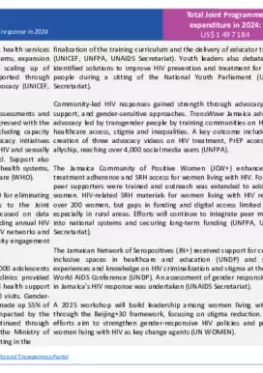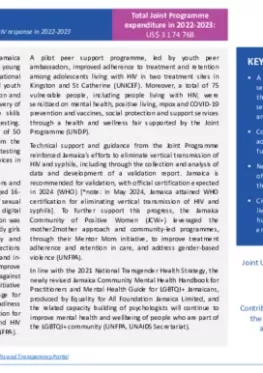|
Jamaica
In 2024, HIV prevention, treatment, and other adolescent health services improved through the decentralization of laboratory systems, expansion of pre-exposure prophylaxis (PrEP) services and the scaling up of adolescent-responsive care. These actions were supported through coordinated technical assistance, policy support and advocacy (UNICEF, WHO).
A combination prevention plan was updated, with gap assessments and actionable recommendations. HIV prevention efforts progressed with the continued development of a national PrEP protocol, including capacity building, monitoring and evaluation systems and advocacy initiatives (WHO). To strengthen HIV treatment systems, a plan for HIV and sexually transmitted infections (STI) service delivery was drafted. Support also guided the integration of HIV surveillance into national health systems, laying the groundwork for more efficient diagnostics and care (WHO).
In 2024, Jamaica received official certification from WHO for eliminating the vertical transmission of HIV and syphilis thanks to the Joint Programme’s support to the government. Support focused on data collection and validation during high-level HIV fora, including annual HIV review, as well as engagement with people living with HIV networks and guidance to meet the gender, human rights and community engagement requirements (UNICEF, WHO, UNAIDS Secretariat).
Adolescent-focused HIV services expanded with over 18,000 adolescents accessing care in 2024. Forty-two adolescent-friendly clinics provided sexual and reproductive health (SRH) counseling, mental health support and HIV testing, while two Teen Hubs logged over 12,000 visits. Gender-responsive HIV programming gained momentum as girls made up 55% of service users. Although youth outreach efforts were impacted by the suspension of the Yute Chatz activities, advocacy continued through trained student and youth leaders. Collaboration with the Ministry of Education also advanced youth-led HIV education, culminating in the finalization of the training curriculum and the delivery of educator training (UNICEF, UNFPA, UNAIDS Secretariat). Youth leaders also debated and identified solutions to improve HIV prevention and treatment for young people during a sitting of the National Youth Parliament (UNAIDS Secretariat).






